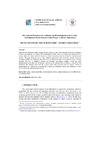Identificador persistente para citar o vincular este elemento:
https://accedacris.ulpgc.es/handle/10553/77572
| Campo DC | Valor | idioma |
|---|---|---|
| dc.contributor.author | Castillo-Palacio, Marysol | en_US |
| dc.contributor.author | Batista Canino, Rosa María | en_US |
| dc.contributor.author | Zuñiga-Collazos, Alexander | en_US |
| dc.date.accessioned | 2021-02-08T12:04:47Z | - |
| dc.date.available | 2021-02-08T12:04:47Z | - |
| dc.date.issued | 2020 | en_US |
| dc.identifier.issn | 2501-1960 | en_US |
| dc.identifier.other | Scopus | - |
| dc.identifier.uri | https://accedacris.ulpgc.es/handle/10553/77572 | - |
| dc.description.abstract | There are few empirical studies focused on the culture, as one of the informal factors that influences business development in a region. The main purpose of this study is to analyze the perception of a society about its cultural practices based on cultural dimensions that are related to entrepreneurial activity. Through literature review, five cultural dimensions that would be closely related to entrepreneurship were identified, which has been corroborated in previous empirical studies. For this research, the city of Medellin (located in Colombia, developing country), which has been characterized by its high rate of business activity at the national level, is taken as context for the fieldwork. The findings show that the society under study perceives that its regional culture is characterized by a high level of assertiveness, hence its competitive nature and propensity to take risks, to boost the entrepreneurial activity. | en_US |
| dc.language | eng | en_US |
| dc.relation.ispartof | Scientific Annals of Economics and Business | en_US |
| dc.source | Scientific Annals of Economics and Business[ISSN 2501-1960],v. 67 (4), p. 517-532, (Enero 2020) | en_US |
| dc.subject | 5311 Organización y dirección de empresas | en_US |
| dc.subject.other | Cultural Dimensions | en_US |
| dc.subject.other | Culture | en_US |
| dc.subject.other | Developing Country. | en_US |
| dc.subject.other | Entrepreneurial Activity | en_US |
| dc.subject.other | Entrepreneurship | en_US |
| dc.subject.other | Globe Project | en_US |
| dc.title | The cultural practices that Influence on the entrepreneurial activity: an empirical study from the globe project cultural dimensions | en_US |
| dc.type | info:eu-repo/semantics/Article | en_US |
| dc.type | Article | en_US |
| dc.identifier.doi | 10.47743/saeb-2020-0032 | en_US |
| dc.identifier.scopus | 85100009944 | - |
| dc.contributor.authorscopusid | 56563074000 | - |
| dc.contributor.authorscopusid | 35758375000 | - |
| dc.contributor.authorscopusid | 55681528600 | - |
| dc.identifier.eissn | 2501-3165 | - |
| dc.description.lastpage | 532 | en_US |
| dc.identifier.issue | 4 | - |
| dc.description.firstpage | 517 | en_US |
| dc.relation.volume | 67 | en_US |
| dc.investigacion | Ciencias Sociales y Jurídicas | en_US |
| dc.type2 | Artículo | en_US |
| dc.utils.revision | Sí | en_US |
| dc.date.coverdate | Enero 2020 | en_US |
| dc.identifier.ulpgc | Sí | en_US |
| dc.contributor.buulpgc | BU-ECO | en_US |
| dc.description.sjr | 0,204 | |
| dc.description.sjrq | Q3 | |
| dc.description.esci | ESCI | |
| dc.description.erihplus | ERIH PLUS | |
| item.grantfulltext | open | - |
| item.fulltext | Con texto completo | - |
| crisitem.author.dept | GIR TIDES: Emprendimiento, Empresa Digital e Innovación | - |
| crisitem.author.dept | IU de Turismo y Desarrollo Económico Sostenible | - |
| crisitem.author.dept | Departamento de Economía y Dirección de Empresas | - |
| crisitem.author.orcid | 0000-0001-8841-6112 | - |
| crisitem.author.parentorg | IU de Turismo y Desarrollo Económico Sostenible | - |
| crisitem.author.fullName | Batista Canino, Rosa María | - |
| Colección: | Artículos | |
Citas SCOPUSTM
1
actualizado el 08-jun-2025
Citas de WEB OF SCIENCETM
Citations
1
actualizado el 08-jun-2025
Visitas
197
actualizado el 07-dic-2024
Descargas
286
actualizado el 07-dic-2024
Google ScholarTM
Verifica
Altmetric
Comparte
Exporta metadatos
Los elementos en ULPGC accedaCRIS están protegidos por derechos de autor con todos los derechos reservados, a menos que se indique lo contrario.
